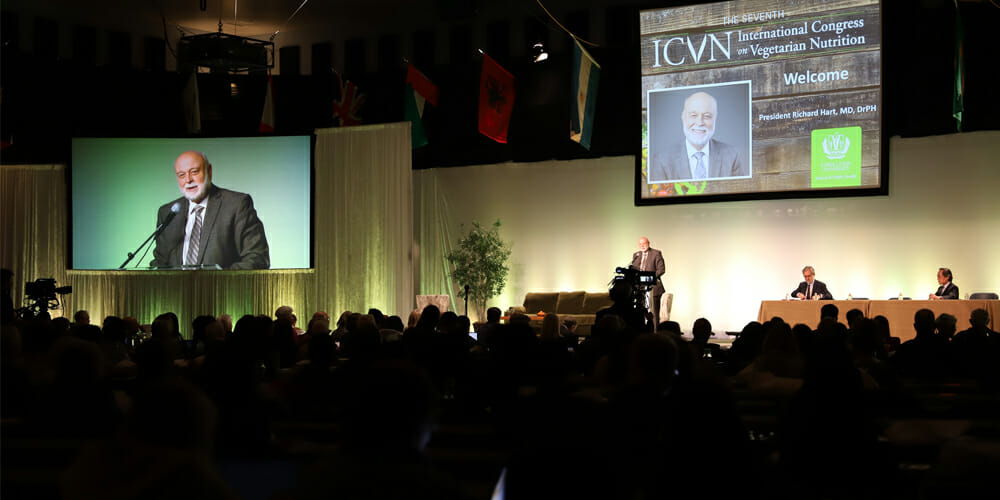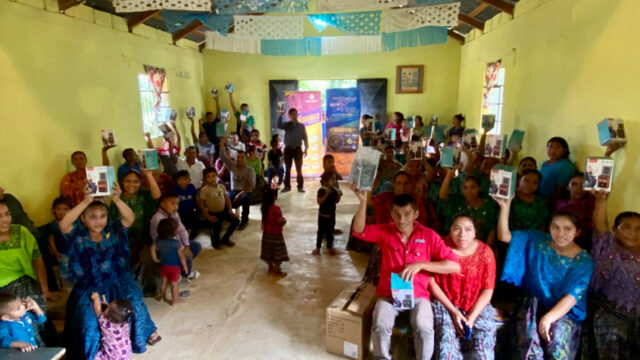Loma Linda Vegetarian Nutrition Congress opens with enlightening presentations.

What follows is part of a series of reports on presentations given at the Seventh International Congress of Vegetarian Nutrition in Loma Linda, California, United States, from February 26-28, 2018. Individual stories provide a summary of various topics covered at the event. ~ Adventist Review Editors
“It’s possible to be a very unhealthy vegetarian,” said Harvard School of Public Health Researcher Frank Hu in his keynote address “Plant-based diet for personal, population, and planetary health.” Hu made this and other ear-catching remarks on February 26, 2018, the opening day of the Seventh International Congress on Vegetarian Nutrition in Loma Linda, California, United States. The event gathered more than 800 nutrition and health professionals from 34 countries for three days of scientific presentations, Q&A sessions, discussions, cooking demonstrations, and networking opportunities.
In welcoming the international group of participants and speakers, Loma Linda University Health president Richard Hart said advising on what to eat or not to eat is nothing new. “Giving nutritional advice is as old as the Bible itself but as new as the newest tablet,” he said. “Seventh-day Adventists have been doing it for over 150 years now, and Loma Linda University has been studying the connections between food and health since at least the 1950’s.”
Nutrition and Other Sciences
Joan Sabaté, Congress chair and director of the Center for Nutrition, Healthy Lifestyle and Disease Prevention of Loma Linda University, also welcomed the health-minded professionals to the event. Sabaté explained that the congress is not a one-discipline event. “This scientific conference is not just about Nutrition and Dietetics,” he said. “Among other sciences, it will integrate Epidemiology, Environmental Sciences, and Education.”
It’s also about asking some hard questions, acknowledged Sabaté. “It includes discussing how do we treat our fellow inhabitants of this planet, and how to best use the resources we have available,” he said just before introducing Hu.
In his presentation, Hu, considered one of the most important authorities in nutrition and chronic diseases in the world, said unhealthy eating is killing people. “An unhealthy diet is the most important modifying factor in the causes of death in the United States,” said Hu, who was part of the team writing the 2015 US Dietary Guidelines. “Science provides evidence that plant-based foods prevent cardiometabolic diseases.”
The Case for the Unhealthy Vegetarian
At the same time, explained Hu, you can be a vegetarian but consume highly-refined grains, sugars, and add to that a low consumption of fruits and vegetables, which makes your diet unhealthy, despite the absence of meat.
In that sense, “not all plant-based diets are healthy,” he said, noting that unhealthy plant-based diets are associated with an increased risk of disease. Referring to Jane E. Brody’s book Good Vegan, Bad Vegan, he quoted, “A vegan who consumes no animal products can be just as unhealthy living on inappropriately selected plant foods as an omnivore who dines heavily on burgers and chicken nuggets.”
Hu’s remarks were echoed later in the day by other scientists, including Adventist Health Study 2 director Gary Fraser. “We need a better definition of a healthy vegetarian diet,” he said, in trying to explain some of the complexities of studies on diet. “It seems very likely that aspects of diet, aside from meat, dairy, and eggs do matter and probably explain the differences between different vegetarian populations.”
Preet K. Dhillon, Senior Research Scientist from the Public Health Foundation of India, agreed. She explained that around 300-400 million people in India are vegetarians. Studies in India have shown, however, that many vegetarian Indians consume more sugar than non-vegetarians. It is something that minimizes the seeming advantages of being a vegetarian, Dhillon said. “Also, non-vegetarians in India consume approximately a tenth of the meat amount consumed by a non-vegetarian in the Western hemisphere,” she explained, something which often makes differences between the group statistically non-significant.
“Air Pollution Makes You Older”
Hu said that unhealthy diets have not only shown correlation to greater risks of suffering diabetes, cancer, and cardiovascular diseases but also to age acceleration. “While exercise, and the consumption of fruits, vegetables, and fish, among others, were shown to help slow aging, a greater body mass index and waist-to-hip ratio, and higher triglycerides and systolic blood pressure seem to accelerate it,” he said.
The same applies to pollution exposure, as recent studies in China have revealed that being exposed to hydrocarbons such as fumes and smoke from various sources increases aging. “Air pollution makes you older,” said Hu.
Importance and Limitations of Precision Nutrition
In the last few years, precision nutrition has attempted to provide personalized diets, which adapt to the specific needs of each person. It is related to recent scientific research, said Hu. For instance, “people eating identical meals present high-variability in post-meal blood glucose response,” he explained. “Personalized diets …that integrate parameters such as dietary habits, physical activity, and gut microbiota” may be helpful to lower post-meal blood glucose and its long-term metabolic consequences.
Many companies are profiting from these discoveries, offering custom-made nutrition guidelines, shared Hu. Precision nutrition, however, is a science in development, he said, and should be balanced with public health strategies, which are usually more economic and proven methods of inducing positive changes.
What We Can Do
“We can support initiatives against unhealthy foods, such as the soda tax, which has proved to be beneficial,” said Hu, who noted that the reduction of trans-fats consumption has also shown a positive correlation with a decrease in deaths. “Also, plant-based meals are more sustainable because they use less water and greenhouse gasses in comparison to meat-based diets, so there’s something we can do about it.”
Putting its money where its mouth is, the ICVN is using reusable name tag holders, potato starch utensils, and post-consumer plates and napkins. The food provided includes a wide selection of locally grown fruits and vegetables, and even the event décor boasts biodegradable balloons.
Echoing Hu’s comments, Hart said that in the end, it’s all about being balanced. “There is not just one good diet,” he said. “The challenge is to adapt the recommendations we have to different cultures around the world.”
The ICVN continues until February 28.








